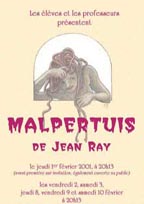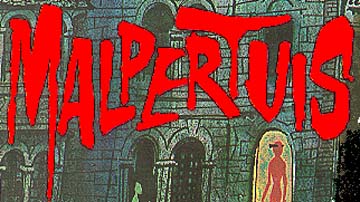

Written by: Jean Ray
(1887-1964).
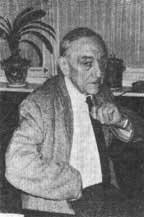 The
most famous author of Belgian fantastique was, without a doubt, Jean Ray who, like Jules Verne
in science fiction, deserves his own section.
The
most famous author of Belgian fantastique was, without a doubt, Jean Ray who, like Jules Verne
in science fiction, deserves his own section.
Ray, whose real name was Jean Raymond
de Kremer, was generally regarded by genre scholars as the French-language equivalent of Poe and Lovecraft. He
began his career as a pulp writer, writing anything and everything, using a variety of aliases, the most famous
being that of "John Flanders." He even had several stories published under that name in the magazine
Weird Tales. Ray lived the adventurous
life of some of his characters, sailing across the seven seas, engaging in colorful, improbable exploits, and during
that time, caring little for his literary reputation.
Ray's gigantic output can be divided into
three parts. Under his own name, he wrote many short stories, which were collected in a number of volumes, and
have since become horror classics, and two novels, Malpertuis and La Cité de l'Indicible Peur [The City Of The Unspeakable Fear]
(both 1943).
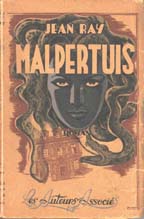 Under the
name of "John Flanders," or any of his other pseudonyms, Ray wrote (often in Flemish) a number of juvenile adventure novels, many incorporating science
fiction or fantasy elements, as well as an estimated 300 stories in various French, Belgian, and Flemish magazines,
including the famous Vlaamse Filmkens
(1930-45).
Under the
name of "John Flanders," or any of his other pseudonyms, Ray wrote (often in Flemish) a number of juvenile adventure novels, many incorporating science
fiction or fantasy elements, as well as an estimated 300 stories in various French, Belgian, and Flemish magazines,
including the famous Vlaamse Filmkens
(1930-45).
The third part of Ray's literary output
was, however, more interesting. Europe, too, had its age of pulps. Some were translations of American series such
as Nick Carter, but many others were written
by native authors. Among these, the best and the most famous of all was an unauthorized Sherlock
Holmes pastiche, Harry
Dickson, sub-titled "the American Sherlock Holmes."
The Novel:
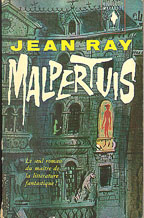 Malpertuis is an ancient house where a dying warlock has
trapped the aging gods of Olympus inside the "skins" of ordinary Flemish citizens. It was made into an
eponymous 1971 film by Belgian film-maker Harry Kumel (see below).
Malpertuis is an ancient house where a dying warlock has
trapped the aging gods of Olympus inside the "skins" of ordinary Flemish citizens. It was made into an
eponymous 1971 film by Belgian film-maker Harry Kumel (see below).
Malpertuis is divided into four narratives:
1) the modern-day narrator (who remains unnamed) explains in a prologue that he stole the manuscripts that comprise
the rest of the novel from the Convent of the White Penitents. In the epilogue, he locates Malpertuis, sees Eisengott
and Old Mother Groulle in a tavern, enters the house, has a brief encounter with Euryale then flees.
2) the oldest narrative (broken into two sections) is credited to Doucedame the Elder and tells the story of the
capture of the Olympians; it has presumably been assembled by Doucedame the Younger.
3) the third narrative is the diary of Jean-Jacques Grandsire (also broken into two parts) that ends when he and
Bets leave Malpertuis.
4) the fourth narrative is by Father Euchere (aka Dom Misseron) of the Convent of the White Penitents, and reveals
the final fates of both Jean-Jacques Grandsire and Doucedame the Younger.
Timeline:
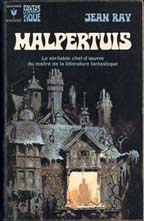 - According
to Doucedame the Younger, Cassave was active in Germany in 1630 among the Rosicrucians and the Illuminati.
- According
to Doucedame the Younger, Cassave was active in Germany in 1630 among the Rosicrucians and the Illuminati.
- The events of the capture of the Olympians are said to have taken place in the "first quarter of the last
century", i.e.: 1800-1825, likely c. 1820.
- The events narratated by Jean-Jacques Grandsire are said to have taken place in the "last quarter of the
last century", i.e.: 1875-1900, starting in the summer and culminating on a Chandeleur Night, February 2 of
the following years. They are roughly sub-divided into 5 phases: (i) before Cassave's death; his will and last
testament; (ii) after Cassave's death, the ccast moves into Malpertuis; then over the next few months various love
affairs and deaths occur, until (iii) a bloody XMas Dinner in which the Olympians strike back and Jean-Jacques
os partially paralyzed; (iv) Jean-Jacques' recovery, brief return to Ghent/Malpertuis, then being taken by Bets
to the Convent of the White Penitents; (v) the final events of Chandeleur Night.
- Father Euchere concluded his own narrative (written at least a few years after the above events, bringing to
light some subsequent information, such as his meeting with Nicolas Grandsire) on 26 September 1898.
The Characters:
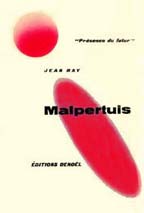 Quentin Moretus Cassave:
Quentin Moretus Cassave:
A warlock of considerable powers. He was active among the Rosicrucians and Illuminati in Bavaria circa 1630. Cassave's
descendents include Anselme Grandsire
(direct), Philarethe ("cousin")
and Charles Dideloo ("nephew").
Circa 1800, Cassave developed the theory that Man either crated or empowered the Olympian Gods and that their shades
still remained. Circa 1820, he sent an expedition to the Greek islands led by Anselme Grandsire and Doucedame the Older, to whom he had entrusted spells powerful
enough to capture the essence of the surviving gods. The Olympians were then taken back to Cassave's stronghold,
the Malpertuis house in Ghent, Belgium, where Cassave used his magicks to trap their essences into bodies manufactured
by Philarethe (a taxidermist). Cassave's ultimate ambition was to produce a man-god offspring between his descendent
Jean-Jacques Grandsire and Euryale the Gorgon. However, Cassave died, presumably
of old age, before he could see his plans realized, although he tried to make it happen through his will and last
testament. In that document, he used the enticement of his vast wealth to force his family, his servants and the
Olympians to live together in Malpertuis, ordering that the last two survivors (hopefully, Jean-Jacques and Euryale)
should marry.
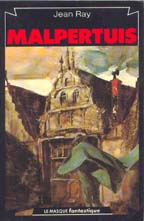 Anselme Grandsire:
Anselme Grandsire:
Roguish seafaring Captain. A big burly man with dark hair. A direct desecendent
of Cassave. He and Doucedame
the Elder were in charge of the c. 1820 expedition sent by Cassave to the
Greek Islands to capture and bring back the essence of the Olympian Gods. While on the Island, Anselme had an affair
with a goddess (unidentified) who later gave birth to Nicolas Grandsire. He died from beriberi in Guinea, date unknown.
Nicolas Grandsire:
Another roguish seafaring captain, also descended from Cassave. He is the son of Anselme Grandsire
and an unnamed goddess, and the father of Jean-Jacques
and Nancy Grandsire. (We do not know who
their mother was, only that she has been dead for a while in the 1890s.) The Grandsires lived in a house located
Quai de la Balise in Ghent, supported by money sent by Nicolas from abroad or gifts from Cassave, raised in part
by old Elodie the cook until the trio
moved to Malpertuis. At that time, Nicolas was in Singapore. Nicolas previously sailed with Doucedame
the Younger, a frequent guest in his house, and knew his secret. Nicolas returned
to Belgium, likely because Doucedame had written to him to tell him about his children's fate. Nicolas confessed
the truth about his children to Father Euchere
on Jean-Jacques' grave.
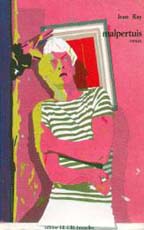 Jean-Jacques Grandsire:
Jean-Jacques Grandsire:
Son of Nicolas Grandsire, brother of Nancy, mother unknown, also descended from Cassave and an unknown goddess. Blond and prone to melancholy,
Jean-Jacques took from his mother's side. Jean-Jacques grew up in the family house Quai de la Balise in Ghent,
and after his mother's death, was raised by Old Elodie
the cook and Doucedame the Younger. After
Cassave's death, as per the warlock's will, Jean-Jacques moved into Malpertuis. He had a one-time affair with Alice Cormelon, one of the Furies, which then triggered
the jealousy of Euryale, who loved him.
He discovered the bodies of Mathias Krook,
almost witnessed Charles Dideloo's death
and almost became the Furies' victim at the XMas Dinner, but every time was protected by Eisengott's intervention. A possessive Euryale then tried to turn Jean-Jacques to stone but, as she
was crying, she only succeeded in paralyzing his legs. Jean-Jacques was taken by Eisengott to Elodie's beach house
to recover. There he met his father and discovered Nancy's ghastly fate. Cured by Eisengott, Jean-Jacques returned
to Ghent where he met and fell in love with Bets.
After a last visit to Malpertuis, a sick Jean-Jacques was taken by Bets to the Convent of the White Penitents where
he was attended by Father Euchere and
Brother Morin. En route they were attacked
by the Furies who were driven away by Euryale. In the final battle, Jean-Jacques made the mistake of looking at
Euryale's form at the peak of her powers and was turned to stone.
Nancy Grandsire:
Daughter of Nicolas Grandsire, sister
of Jean-Jacques, mother unknown, also
descended from Cassave and an unknown
goddess. Dark-haired, plucky Nancy had inherited her father's roguish tendencies. Nancy grew up in the family house
Quai de la Balise in Ghent before moving to Malpertuis at Cassave's request. She managed the house and the adjacent
paint store with Mathias Krook, with whom
she had an affair. After Charles Dideloo's
death, Nancy left Malpertuis and, in undisclosed events, was captured by Old
Mother Groulle who killed her but somehow managed to preserve Nancy's life
in Nancy's pair of eyes which she placed inside a glass jar. Jean-Jacques eventually discovered the jar in the
possession of their father, who had returned from Singapore.
Doucedame the Elder:
Fat, jolly, but ruthless priest who was in cahoots with Cassave and accompanied Anselme Grandsire
on the expedition to the Greek Islands to capture the shades of the Olympians. Cassave trusted him enough to give
him the necessary spells to succeed. We do not know his ultimate fate. He was the father of Doucedame
the Younger.
Doucedame the Younger:
Son of Doucedame the Elder. Also a priest, one often tempted by gluttony. He tried to atone for his father's sins and
became a missionary. A learned man, Doucedame published a study about the Dietterling engravings, a biography of
Gerard Dow and continued Dr. Mises of Leipzig's studies on Angels. He traveled abroad with his friend, Nicolas Grandsire, and mysteriously contracted the curse
of the werewolf. Upon his return to Ghent, Philarethe
made a magic wolf skin to contain the curse. He spent a lot of time Quai de la Balise teaching Jean-Jacques Grandsire. Aware of Cassave's plans, after the warlock's death, he paid secret visits to Malpertuis to try to save Jean-Jacques.
After the XMas Dinner, he summoned the avenging ghosts of the Barbusquins Monks to stop the Furies. When an ailing Jean-Jacques was at the Convent of the White Penitents, he visited him but
could not prevent his demise. Bets recognized
his curse and ordered Father Euchere to
burn Philarethe's wolf skin, which destroyed the curse but also killed Doucedame who died soon after, after confessing
the entire story.
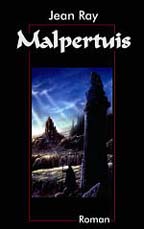 Philarethe:
Philarethe:
Last name unknown. A cousin of Cassave by blood. A prodigious, and obssessed, taxidermist. At Cassave's behest, Philarethe had made
the human-like shells in which the Olympians' essence were poured after their capture. He also made a wolfskin
to carry Doucedame the Younger's curse,
which he entrusted to his friend, Piekenbot.
After Cassave's death, Philarethe moved into Malpertuis, where he played chess with Dr.
Sambucque. He took the bodies of Mathias
Krook, Charles Dideloo and Tchiek and tried
to reanimate them, but without Cassave's spells, could not. The Olympians were still a little afraid of him because
of Cassave's power. After Jean-Jacques Grandsire
returned to Malpertuis, a mad Philarethe tried to kill him to stuff him too, but was then turned to stone by Euryale. His ghost appeared to Piekenbot to order him
to take the wolfskin back to Doucedame.
Charles Dideloo:
Nephew of Cassave
whom he called "Great Uncle." Also Uncle to Jean-Jacques and Nancy Grandsire,
which might mean he was Nicolas Grandsire's
wife's brother although there is a reference to him being of the blood of Cassave. They were the "foster parents"
of Euryale. A former teacher, then a civil
servant, Dideloo and his wife, Sylvie,
retired and moved into Malpertuis after Cassave's death. The flirtatious Dideloo had an affair with Alice Cormelon at his love nest, No. 7 Rue de la Tête
Perdue. There, he was later killed by the Furies.
Sylvie Dideloo:
Hypochondriac wife of Charles Dideloo and acting "foster parent"
of Euryale. She was turned to stone by Euryale after the XMas dinner.
Euryale (Medusa, the Gorgon):
Stunning red-haired, green-eyed girl who has retained her Olympian strength
and power. Cassave entrusted her to the
Dideloos, hoping that she would eventually
mate with Jean-Jacques Grandsire (his
own descendent) to produce a race of man-gods. Jean-Jacques' affair with Alice
Cormelon triggered Euryale's jealousy. Possessively, she tried to turn him
into stone after the XMas dinner but as she was crying, she only paralyzed his legs. She turned Sylvie Dideloo
to stone. Later, she rescued Jean-Jacques from Philarethe
and turned the taxidermist to stone. She then fought the Furies, but a hapless Jean-Jacques saw her in her Gorgon-form and was turned to stone. She was still
living in Malpertuis when the Narrator went there.
Eleonore, Rosalie and Alice Cormelon (The
Furies: Tisiphone, Megere and Alecto):
Three sisters, Eleonore being the oldest, Alice
the youngest and prettiest. They moved into Malpertuis after Cassave's death. Alice had a brieg affair with Jean-Jacques Grandsire, and with Charles Dideloo.
Eleonore later killed Dideloo and, at the XMas dinner, ordered Griboin to incinerate Dr. Sambucque
and tried to kill Philarethe and Jean-Jacques.
They were stopped only by Doucedame's
summoning of the avenging ghosts of the Barbusquin Monks. Later, the Furies fought with Euryale over Jean-Jacques and were finally turned to stone by the full, unleashed power of the Gorgon.
Lampernisse (Prometheus):
Tall, thin man who used to manage the paint store adjacent to Malpertuis, until his Olympian past caught up with
him and he went mad. Lampernisse now haunts Malpertuis, living in its darkest recesses, trying to hold on to light
and colors, but still hunted by the Eagle. He disposed of Tchiek. The Eagle eventually blew off all the lights, caught up with him and devored his entrails.
Mathias Krook (Apollo):
Handsome young man who managed the paint store adjacent to Malpertuis. He
had an affair with Nancy Grandsire. He
was murdered (unclear by whom?); Jean-Jacques Grandsire
found him, his head nailed to the wall, but Philarethe
managed to have his "shell" continues to sing in his beautiful voice.
Mr. Griboin (Vulcan) & Mrs. Griboin (Venus):
Avaricious servants in Malpertuis, part of Cassave's Olympian household. They used Tchiek, although they feared him, to help them clean the house.
During the Xmas dinner, at Eleonore Cormelon's
request, Mr. Griboin spit flame to incinerate Dr. Sambucque. Their ultimate fate was unspecified but one assumes they were destroyed by Euryale.
Tchiek (Titan):
Mysterious name given to the golem-like helper who who assisted the Griboins in their housecleaning duties at Malpertuis.
He seemed made of stone and had a shapeless face with slits for eyes and mouth. He was the sole surviving Titan
found on the Island. The Griboins feared Tchiek who was kept in check through spells. He was somehow destroyed
by Lampernisse and his "shell"
was then preserved by Philarethe.
Dr. Sambucque:
One of Cassave's
human servants. A small, frail man, he had known the warlock for 40 years. After Cassave's death, he moved into
Malpertuis, taught Philarethe how to play
chess, and was incinerated by Griboin
during the XMas dinner.
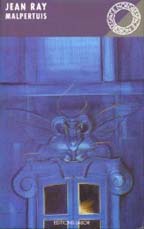 Eisengott (Jupiter):
Eisengott (Jupiter):
Tall, majestic, grey-bearded man who lives in a house located behind Old Mother Groulle's house, running some kind of clockmaking
/ antiquarian business. He was a witness to, but not part of, Cassave's will. He then protected Jean-Jacques Grandsire from the Furies and
cured him after the young man had been partially paralyzed by Euryale (using the alias of "Dr. Mandrix"). He later revealed like, unlike the other Olympians,
he had not been enslaved by Cassave's spells but accompanied them back to Ghent of his own free will. He was still
around withGroulle when the Narrator told his story.
Old Mother Groulle (Juno):
Repulsive Old Woman who owned the house located at No. 7, rue de la Tête
Perdue. She had a cat named Lupka. She killed Nancy Grandsire and put her eyes in a glass jar. She was still around with Eisengott when the Narrator told his story.
Bets:
Blond waitress in a tavern near the Rue de la Tête Perdue. She befriended
Jean-Jacques Grandsire upon his return
to Ghent and eventually fell in love with him. She trusted Eisengott and took an ailing Jean-Jacques to the Convent of the White Penitents to place him under God's
protection and save him from the wrath of the Furies and jealous Euryale. Bets' previous fiancé had been afflicted with the curse of the werewolf and she was
instrumental in recognizing Doucedanme the Younger's
affliction for what it was.
Elodie:
Old Elodie was the cook at the Grandsire House who helped raised Jean-Jacques and Nancy. She then moved to Malpertuis, but left soon after Nancy did, moving back to her little cottage
by the sea. There, she later helped take care of an ailing Jean-Jacques.
Piekenbot:
Friend of Philarethe. After Philarethe's
death, he had a dream in which the taxidermist instructed him to taker the wolf skin left in his care and deliver
it to Doucedame the Younger.
Anacharsis:
Greek captain of the Fena who, during a tempest, saw the Island of the Gods. Shipwrecked, he was rescued by Anselme Grandsire and Doucedame
the Elder to whom he told his vision. He was then strangled by Doucedame.
Schamp:
Cassave's Notary who drafted his will and last testament.
The Locations:
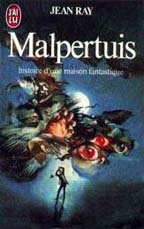 The Island of the Gods:
The Island of the Gods:
The Greek Island where Anselme Grandsire
and Doucedame the Elder located the shades
of the Olympians was located near the island of Paros in the Cyclades, even though Greek Captain Anacharsis who had sailed these waters before had never
seen it previously.
Malpertuis:
Cassave's lair. A grand bourgeois house which derived its name from Renard's
lair from the medieval folk tales. Its name means Evil House, House of Malice, and Renard -- the Fox -- symbolizes
a powerful, evil warlock. It is located on the rue du Vieux Chantier; at the end of the street are a square with
trees, a fountain, a pigeon-house and the Chapel of the Virgin of Seven Dolors. Malpertuis is huge, with many rooms,
floors, staircases, etc. Three cellars are mentioned, endeless stairs and a huge attic inhabited by "little
people." Adjacent to it is a store selling paints, pigments and varnishes: "Lampernisse
Couleurs & Vernis." Malpertuis is bsacked by a very large garden
/ small park, enclosed behind very tall stone walls. The park contains am oak grove, a deep pond with ink-blasck
waters, and the ruins of the Convent of the Barbusquins, a mysterious order of Avenging Monks. Malpertuis appears
to have been built on some kind of dimensional nexus.
Quai de la Balise:
Ghent location of the Grandsires house.
No. 7, rue de la Tête Perdue:
Hovel-type house belonging to Old Mother
Groulle. She rents rooms to prostitutes, etc. It was used by Charles Dideloo as his love nest, and later by Jean-Jacques
Grandsire as his refuge. It is located next to the Place des Ormes and adjacent/right behind it, on the Rue du
Martinet, is Eisengott's shop/residence.
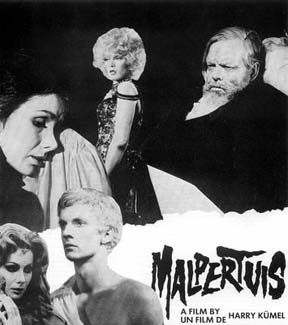
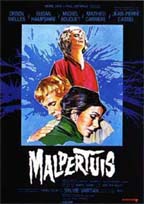 Malpertuis (1971)
Malpertuis (1971)
Dir: Harry Kümel
Wri: Jean Ferry based on the novel by
Jean Ray
Cast: Orson Welles (Cassave), Susan Hampshire
(Nancy/Euryale/Alice), Michel Bouquet (Dideloo), Mathieu Carrière (Jan (Jean-Jacques)), Jean-Pierre Cassel
(Lampernisse), Daniel Pilon (Mathias Krook), Walter Rilla (Eisengott), Dora van der Groen (Sylvie Dideloo), Charles
Janssens (Philarete), Sylvie Vartan (Bets), Jet Naessens (Eleonore), Cara Van Wersch (Rosalie), Jenny Van Santvoort
(Elodie), Fanny Winkler (Mrs. Griboin), Robert Lussac (Mr. Griboin), Edouard Ravais (Doucedame).
Music: Georges Delerue; Cinematography: Gerry Fisher.
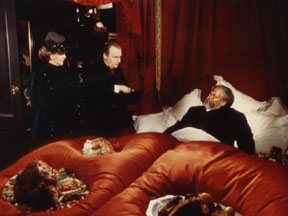
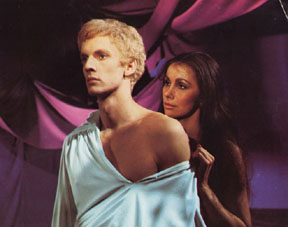
There is also a stage play adaptation, performed in Belgium:
